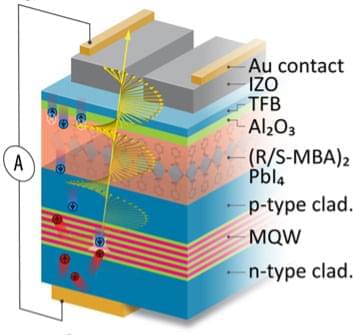In 2021, the same collaborators developed the technology that acts as an active spin filter made of two successive layers of material, called chiral hybrid organic-inorganic halide perovskites. Chirality describes a molecule’s symmetry, where its mirror image cannot be superimposed on itself. Human hands are the classic example; hold yours out, palms facing away. The right and left hands are arranged as mirrors of one another—you can flip your right hand 180° to match the silhouette, but now the right palm is facing you while the left palm faces away. They’re not the same.
Some molecules, such as DNA, sugar and layers of chiral hybrid organic-halide perovskites, have their atoms arranged in chiral symmetry. The filter works by using a “left-handed” oriented chiral layer to allow electrons with “up” spins to pass, but block electrons with “down” spins, and vice versa. At the time, the scientists claimed the discovery could be used to transform conventional optoelectronics into spintronic devices simply by incorporating the chiral spin filter. The new study did just that.
“We took an LED from the shelf. We removed one electrode and put the spin filter material and another regular electrode. And voila! The light was highly circularly polarized,” said Vardeny.










Leave a reply